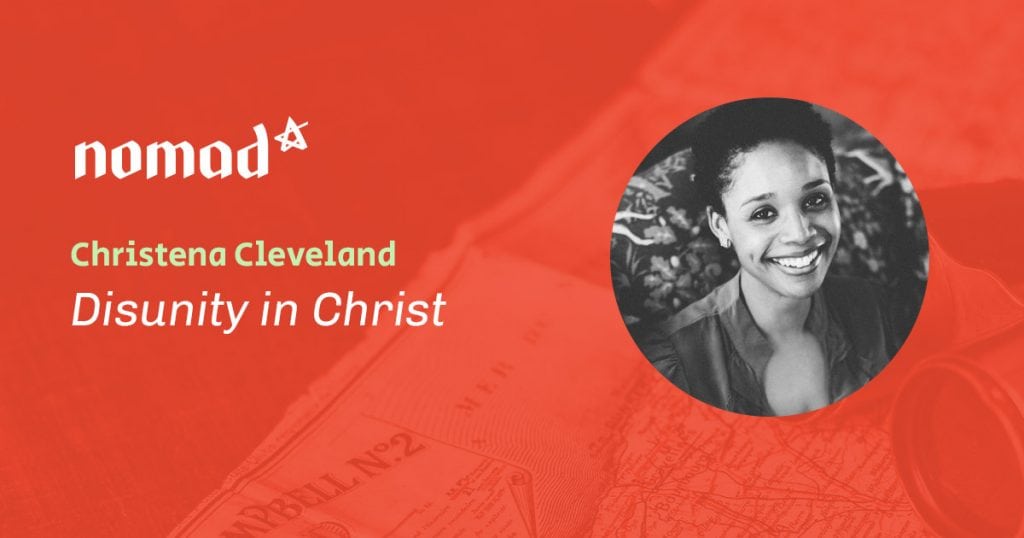Why is the Church divided into over 40,000 denominations? Why do Churches in the same town often have very little to do with each other? Why are Christians always fighting on social media? It doesn’t seem much like the one new humanity Jesus came to establish! To find some answers we quiz social psychologist, Christena Cleveland.
Interview starts at 7m 18s

Image provided by Christena Cleveland. Used with permission.
BOOKS
Disunity in Christ: Uncovering the Hidden Forces that Keep Us Apart
QUOTES
“In the secular world or in the academic world, all of the research on diversity in groups shows that diverse groups might experience more conflict because there are more perspectives to take into account but overall they are healthier groups because they keep growing and having a diversity of perspectives is actually strengthening, actually adaptive.”
“We build these close knit groups and in a lot of ways that’s a good thing. (I mean group formation is pro social in a lot of ways.) The downside of that it that when we form a group with people we tend to form a group in a circle that includes us but excludes everybody else and so my identity is wrapped up in my church.”

4 Responses
Hello guys.
I enjoyed the interview, as usual. As you know, I have a problem calling myself a Christian at all, despite my recognition and participation in many denominations. What attracts me are the individuals I have formed relationship within these “tribes” but I wholeheartedly reject the tribal mentality which expects me to “conform” my beliefs into an “us and them” mentality. Progressives and liberal denominations seem to do it as much as more traditional, conservative, and/or orthodox denominations do it. You seem to do it as well especially when you exclude other faiths. Ms. Cleveland made a comment at one point in the conversation that suggested that Christians should recognize themselves as part of the family of God. She resorts to Paul’s rhetoric about the “body” and its parts which seems nonsensical to me as the foot or other parts of the body do not have their own consciousness. I agree that many of the division’s within denominations which are Christian stem from something much more human and that there are processes at work which have a darker side. I came to realize that God cannot exist as it is not “good”, “reasonable”, “righteous”, “holy” “compassionate” or “loving” that a being like God, who is really more human than divine, would allow all this mess to happen and stand idly by with some preoccupation with interfering with “free will” (which this being seems to do anyway). I came to realize that in good conscience I could believe God exist. I came to this conclusion because of other Christians. I find it really difficult to believe that even the most progressive or liberal Christians are any more “enlightened” than their counterparts. There is a lack of diversity of thought in EVERY church as one person (preacher regardless of gender or race) tells the rest what do, how to act and what to think every Sunday morning. I don’t diversity is the answer. Progressives will never go to a fundamentalist group. I agree with you that being in community is always a risk. Still, it seems to me that when you are talking about Christian the community matters more than the individual. I cannot say that the larger group of people are right. I think communities are incapable of “loving” as it is an individual who learns to love another individual. Communities do not have that level or much power of discernment. Community says – it doesn’t matter what the individual think. Change or leave the community. Diversity it NOT acceptable within community within a Christian context.
By the way, how does one really define diversity?
Even as she spoke about she looks at Unitarian views of God again there seems to be a nonsensical reference to Paul’s views in Philippines. Nonsensical as he cannot be referring to a Trinity as the idea of the Trinity wasn’t formed until hundreds of years later. Also, I don’t think anyone can relate to it as it is a mystery, isn’t it?
I think Ms. Cleveland has good intentions, and I can imagine being such a Christian, if I didn’t have to believe that God exists in the first place. Belief, faith, and hope, as I may have expressed before, are obstacles to TRUTH. If God really existed, why would I need to belief, to have faith in or of, or hope in?
When at the end you mentioned how much more open Jesus and his disciples were than the Pharisee…I thought, really? John and arguable some of the other disciples, were anti-Semitic (which means they were a self-hating Jews). They rejected their “tribes” to start another. And need I mention Jesus coming down on clouds in full battle gear presumably, to slaughter humanity as the writer of Revelation shows? More open? Really?
Keep up the good work, guys!
Hi Matteo,
Thanks again for your responses to our podcast, and taking the time to encourage us but also to share your concerns.
I’m wondering if you could tell me a little bit more about your story? You seem to have once been a follower of Jesus, but now don’t believe in God. And yet you seem to appreciate our podcast and often thank us for the good work we do. But the work we do is all about what it means to believe in God and follow Jesus. So I’m wondering if your story might help me understand you interest in the podcast. Perhaps you still have friends who are Christians?
Tim
So good!!! Great questions and insightful responses.
Thanks Judy!